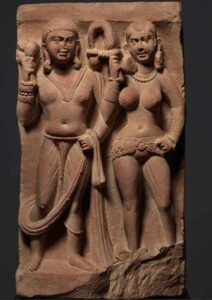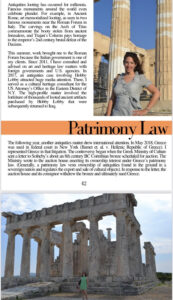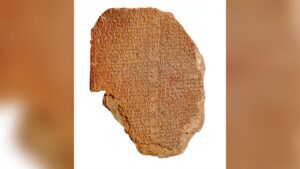by Amineddoleh & Associates LLC | Oct 5, 2021 |

Indian relief seized from the Nancy Wiener Gallery in Manhattan.
(Photo Credit…Manhattan District Attorney’s Office)
Our founder, Leila A. Amineddoleh, spoke with the New York Times today about important revelations from statements submitted to the New York County Supreme Court by antiquities dealer Nancy Wiener during the pending criminal case against her. After pleading guilty to charges of conspiracy and possession of stolen property in connection with the trafficking of looted treasures from India and Southeast Asia, Ms. Wiener filed an allocution statement that reveals the inner workings of the antiquities market. (After pleading guilty, a defendant is often offered an opportunity to address the court in a so-called allocution statement to accept responsibility, express remorse, and explain circumstances that might be considered favorably in sentencing.)
Ms. Wiener and her late mother sold works to the New York elite. They are credited with growing the market for Southeast Asian art, selling works to John D. Rockefeller III, Igor Stravinsky and Jacqueline Kennedy. Works from their gallery also appear at major museums nationally and internationally. In March 2015, Ms. Wiener reimbursed the National Gallery of Australia over a million dollars for a Buddha she had sold the institution in 2007, after it was discovered that the export of the item may have violated India’s laws.

National Gallery of Australia’s Seated Buddha (Photo Credit: Chasing Aphrodite)
In 2016, federal officials and the Manhattan District Attorney’s Office raided a number of galleries during Asia Week in New York. One of those galleries belonged to Ms. Weiner. The government seized objects from her gallery, arrested Ms. Wiener, and filed a felony complaint accusing the dealer of working with stolen objects for decades. Amineddoleh has spoken about the criminal case against Ms. Wiener in the past, including in 2017 when she was invited to speak during a conference for the National Trust for Historic Preservation.
The charges allege that Ms. Wiener obtained millions of dollars’ worth of stolen artifacts from international smugglers and sold them illegally — often through major auction houses. She is alleged to have laundered the illicit items by procuring restoration services to hide damage from illegal excavations, using straw purchases at auction houses to create sham provenances, and inventing and disseminating false histories to circumvent international patrimony laws that prohibit the exportation of looted antiquities. Upon her mother’s death, Ms. Wiener allegedly inherited hundreds of illicit items, discarded their records, and fabricated provenances. She then consigned hundreds of lots for sale at auction for millions of dollars.
In pleading guilty to these allegations, Ms. Weiner’s allocution statement reveals a great deal about the antiquities market. She characterizes that market as “a conspiracy of the willing,” saying that antiquities are often sold or consigned despite having suspect provenance — or no provenance at all. She also admits in detail to committing the common (and illegal) practice of fabricating provenance information to facilitate the sale or consignment of looted items. Despite claiming that her actions were motivated by her “passion” for the “great beauty” of historical objections, Ms. Weiner acknowledges that “it is not the right of any individual or institution to decide how to handle the cultural patrimony of another nation.”
Read more about the case in this article by Tom Mashberg.
by Amineddoleh & Associates LLC | Sep 28, 2021 |
 Our founder, Leila A. Amineddoleh, will be presenting a lecture for the Department of Art History at New York University on October 7 at 6:30 pm. Entitled “Cultural Heritage, the Law, and Looting,” Leila’s lecture will examine legal issues related to the trade in cultural heritage items. As a graduate from New York University, our founder is honored to be featured by the Department of Art History, one of the leading art history departments in the world.
Our founder, Leila A. Amineddoleh, will be presenting a lecture for the Department of Art History at New York University on October 7 at 6:30 pm. Entitled “Cultural Heritage, the Law, and Looting,” Leila’s lecture will examine legal issues related to the trade in cultural heritage items. As a graduate from New York University, our founder is honored to be featured by the Department of Art History, one of the leading art history departments in the world.
The free lecture will be hosted via Zoom, and it is open to the public, but registration is required. Additional details can be found HERE.
by Amineddoleh & Associates LLC | Aug 16, 2021 |
 Our founder has been featured in the Art She Says summer 2021 French Riviera Issue. Her contribution to the magazine discusses art theft, forgeries, government ownership of cultural heritage, World War II restitution matters, and artists’ rights, with a particular focus on the firm’s work and her experience as an art lawyer. This includes our firm’s recent representation of the Italian and GreekMinistries of Culture in federal court. These were landmark cases, sending the message that foreign sovereigns can continue to monitor the art market without fearing lawsuits when making inquiries as to potentially looted antiquities’ whereabouts. The article also touches on the forfeiture of antiquities from Hobby Lobby, since Leila served as a cultural heritage consultant for the U.S. Attorney’s Office in that matter, and another forfeiture case concerning a 13th century painting.
Our founder has been featured in the Art She Says summer 2021 French Riviera Issue. Her contribution to the magazine discusses art theft, forgeries, government ownership of cultural heritage, World War II restitution matters, and artists’ rights, with a particular focus on the firm’s work and her experience as an art lawyer. This includes our firm’s recent representation of the Italian and GreekMinistries of Culture in federal court. These were landmark cases, sending the message that foreign sovereigns can continue to monitor the art market without fearing lawsuits when making inquiries as to potentially looted antiquities’ whereabouts. The article also touches on the forfeiture of antiquities from Hobby Lobby, since Leila served as a cultural heritage consultant for the U.S. Attorney’s Office in that matter, and another forfeiture case concerning a 13th century painting.
Leila’s contribution concludes with an overview of due diligence and intellectual property rights, which are crucial for private collectors, particularly with the vast number of forgeries and stolen works on the market. The magazine also includes photographs taken by Leila. We invite you to visit the Art She Says website and read the issue to discover more about Leila’s contribution, as well as the other interesting and valuable articles in the publication. Art She Says is the leading digital magazine that empowers women in the art world through the curation of luxury content, networking events, and art advisory services.
An online copy of the article is available HERE.
by Amineddoleh & Associates LLC | Jul 28, 2021 |

“Gilgamesh Dream Tablet” (Photo courtesy of US Department of Justice)
The epic saga of Gilgamesh continues as Hobby Lobby is once again caught in the crossfire of illicit antiquities trafficking. Yesterday, federal authorities forfeited a 3,500 year old clay cuneiform tablet known as the “Gilgamesh Dream Tablet” from the crafting giant. The tablet contains a portion of the “Epic of Gilgamesh” where the protagonist describes his dreams to his mother. It is considered a rare and ancient masterpiece of world literature.
The federal government had originally seized the tablet in 2019 and filed a civil forfeiture action in May 2020 to return it to Iraq. The tablet’s provenance was falsified to assert that it had been discovered in a box purchased at a California auction in 1981. In reality, the item had been purchased by an American dealer in London in 2003, who then brought it to the US. This timing coincided with widespread looting of archaeological sites in Iraq as a result of the ongoing war with the US. Hobby Lobby purchased the tablet for $1.6 million at a Christie’s auction in 2014, relying on the auction house to perform the appropriate due diligence. It transpired that the previous owner had warned Christie’s that the tablet’s stated provenance would not withstand scrutiny. The auction house failed to notify Hobby Lobby of this fact even after the craft company had expressed concerns. Ultimately, Hobby Lobby cooperated with the authorities and consented to the tablet’s forfeiture.
However, this is not Hobby Lobby’s first brush with the law over looted Middle Eastern antiquities. In 2010, representatives of Hobby Lobby purchased thousands of antiquities originating from Iraq for display at the future Museum of the Bible. The provenance information for the objects was fabricated, listing their origin as Israel or Turkey to avoid suspicions of illicit trafficking. Notably, Hobby Lobby consulted a respected cultural heritage expert regarding its acquisition, but went against her advice and continued with the transaction, ignoring several red flags indicating that the items had been looted. In 2017, a civil forfeiture action was filed and Hobby Lobby agreed to pay a $3.3 million fine and return over 5,500 looted objects to Iraq.
In this instance, our founder Leila Amineddoleh served as a cultural heritage law expert for the Eastern District of New York. She was extensively quoted on her participation in the matter in national media and trade outlets. She noted how the verdict resulted in greater public scrutiny over the purchase of antiquities and a higher expectation of due diligence measures related to provenance, even for so-called “inexperienced” purchasers. (Information about the matter can be found in our prior blog posts here and here.) This approach has indeed borne fruit, as the forfeiture of the Gilgamesh Dream Tablet demonstrates.
Law enforcement authorities in the US have been actively pursuing black market antiquities and disrupting trafficking networks for some time, but judicial enforcement and specialist support are also crucial. Many countries that suffer from cultural property looting and trafficking, including Iraq, have applicable provenance laws that cover items like the tablet. Furthermore, the US has placed import restrictions on Iraqi cultural property since 1990 and implemented sanctions as recently as 2010, allowing the government to seize objects at or after import. Judicial precedent has empowered US courts to recognize foreign patrimony laws and classify such objects as stolen property, increasing their protection on US soil, but government agents rely on knowledgeable attorneys and experts to advise them on cultural property protection and available legal remedies.
Amineddoleh & Associates LLC is proud to have a founder that has advised the government extensively on such matters and is a staunch advocate for responsible acquisition practices to combat the illicit antiquities trade. Our firm deals with various cases involving potentially looted items on behalf of private and public parties, and we are committed to ensuring that cultural property is protected irrespective of origin. Our strong track record in this field is a testament to our expertise and commitment to stemming the trade in looted objects. We commend the Department of Justice for its excellent work and look forward to continued collaboration in the future with law enforcement to ensure that looted antiquities return to their rightful homes.
by Amineddoleh & Associates LLC | Apr 19, 2021 |
 Join our founder and other experts for an important event addressing the effects of international sanctions on the preservation and protection of cultural heritage. Iran’s astounding cultural heritage has developed over many millennia. But during the past decade, Iranian heritage has had to contend with the sanctions era, a period in which political and practical challenges have made heritage management, research, and cultural tourism more difficult. In this unique webinar hosted by the Heritage Management Organization and the Bourse & Bazaar Foundation, these challenges will be discussed by experts with first-hand knowledge of how Iran’s cultural sector has had to adapt in order to remain connected to global exchanges on arts, culture, and shared patrimony.
Join our founder and other experts for an important event addressing the effects of international sanctions on the preservation and protection of cultural heritage. Iran’s astounding cultural heritage has developed over many millennia. But during the past decade, Iranian heritage has had to contend with the sanctions era, a period in which political and practical challenges have made heritage management, research, and cultural tourism more difficult. In this unique webinar hosted by the Heritage Management Organization and the Bourse & Bazaar Foundation, these challenges will be discussed by experts with first-hand knowledge of how Iran’s cultural sector has had to adapt in order to remain connected to global exchanges on arts, culture, and shared patrimony.
The discussion will be moderated by Kyle Olson of the University of Pennsylvania, whose five-part article series published by the Bourse & Bazaar Foundation, explored the impact of sanctions on the cultural heritage sector in Iran. Our founder has written about the effects of politics on heritage (with an emphasis on Iran) in a law review article published in 2020, available here: https://papers.ssrn.com/sol3/papers.cfm?abstract_id=3572987
Our law firm addressed the topic in a blog post here (https://www.artandiplawfirm.com/why-cultural-heritage-should-not-be-destroyed-to-punish-a-nation/). Our founder even drafted the official statement of the Lawyers’ Committee for Cultural Heritage Preservation (LCCHP) calling for the protection of heritage in Iran.
Register for the April 27 event here: https://mailchi.mp/bourseandbazaar.com/iran-heritage-management-under-sanctions


 Our founder, Leila A. Amineddoleh, will be presenting a lecture for the Department of Art History at New York University on October 7 at 6:30 pm. Entitled “Cultural Heritage, the Law, and Looting,” Leila’s lecture will examine legal issues related to the trade in cultural heritage items. As a graduate from New York University, our founder is honored to be featured by the Department of Art History, one of the leading art history departments in the world.
Our founder, Leila A. Amineddoleh, will be presenting a lecture for the Department of Art History at New York University on October 7 at 6:30 pm. Entitled “Cultural Heritage, the Law, and Looting,” Leila’s lecture will examine legal issues related to the trade in cultural heritage items. As a graduate from New York University, our founder is honored to be featured by the Department of Art History, one of the leading art history departments in the world. Our founder has been featured in the
Our founder has been featured in the 
 Join our founder and other experts for an important event addressing the effects of international sanctions on the preservation and protection of cultural heritage. Iran’s astounding cultural heritage has developed over many millennia. But during the past decade, Iranian heritage has had to contend with the sanctions era, a period in which political and practical challenges have made heritage management, research, and cultural tourism more difficult. In this unique webinar hosted by the Heritage Management Organization and the Bourse & Bazaar Foundation, these challenges will be discussed by experts with first-hand knowledge of how Iran’s cultural sector has had to adapt in order to remain connected to global exchanges on arts, culture, and shared patrimony.
Join our founder and other experts for an important event addressing the effects of international sanctions on the preservation and protection of cultural heritage. Iran’s astounding cultural heritage has developed over many millennia. But during the past decade, Iranian heritage has had to contend with the sanctions era, a period in which political and practical challenges have made heritage management, research, and cultural tourism more difficult. In this unique webinar hosted by the Heritage Management Organization and the Bourse & Bazaar Foundation, these challenges will be discussed by experts with first-hand knowledge of how Iran’s cultural sector has had to adapt in order to remain connected to global exchanges on arts, culture, and shared patrimony.